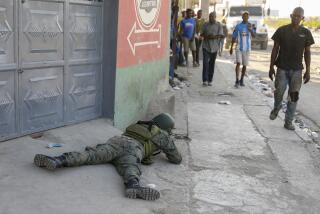Yugoslavia--Pay Now or Pay Later : The necessity, on balance, of U.N. intervention
- Share via
The U.N. Security Council is expected in a few days to accept Secretary General Boutros Boutros-Ghali’s plan to send as many as 13,000 peacekeeping troops to Croatia, where bloody internecine strife over the last seven months has taken as many as 10,000 lives, most of them civilian.
The dispatch of the multinational force is strongly supported by most European countries and has been recommended by special U.N. envoy Cyrus Vance, who in early January succeeded in negotiating a shaky cease-fire between Croats and Serbs in the republic, which declared its independence from Yugoslavia last June.
It will not be an operation run on the cheap. The one-year cost for supporting a U.N. force of the size expected is estimated at $400 million.
A longstanding formula apportions about half the expense of peacekeeping operations among the five permanent members of the council, with the U.S. share about 30%. Is it worth it?
Consider the alternatives to trying to arrest the infection from this deep Balkan wound: continued ethnic conflict where noncombatants are the chief victims; the prospect of thousands of refugees fleeing to neighboring states; the further destruction of historic sites and of Croatia’s economy; a growing temptation for outsiders to intervene in less than benign ways. Yes, it’s very clearly worth it.
It will not, though, be a risk-free operation, as Carol J. Williams reports in The Times today. Experience elsewhere has made clear that the blue helmets of the United Nations do not assure immunity from attack. Milan Babic, leader of the Serb enclave of Krajina in Croatia and an opponent of U.N. intervention, is already warning of “large casualties” when foreign troops arrive. Franjo Tudjman, Croatia’s president, indicates he’s ready to accept the U.N. force, though with reservations. Among other things Tudjman wants the international force to help Croatia regain the one-third of its territory now controlled by local Serbs and the Serb-dominated Yugoslav army. That is emphatically not in the cards.
This peacekeeping mission could in fact go on for some time, as other supposedly short-term U.N. interventions have, because realistically the centuries-old enmity between Croats and Serbs is unlikely to abate soon. About 30 nations--not including the United States or most major European countries--have nonetheless offered to contribute forces. A risk to these forces exists. But the effort is necessary and worthwhile, for in the end the human costs and the threat to regional stability of letting the situation fester would far outweigh any of the costs associated with trying to control the bloodshed.
More to Read
Sign up for Essential California
The most important California stories and recommendations in your inbox every morning.
You may occasionally receive promotional content from the Los Angeles Times.












